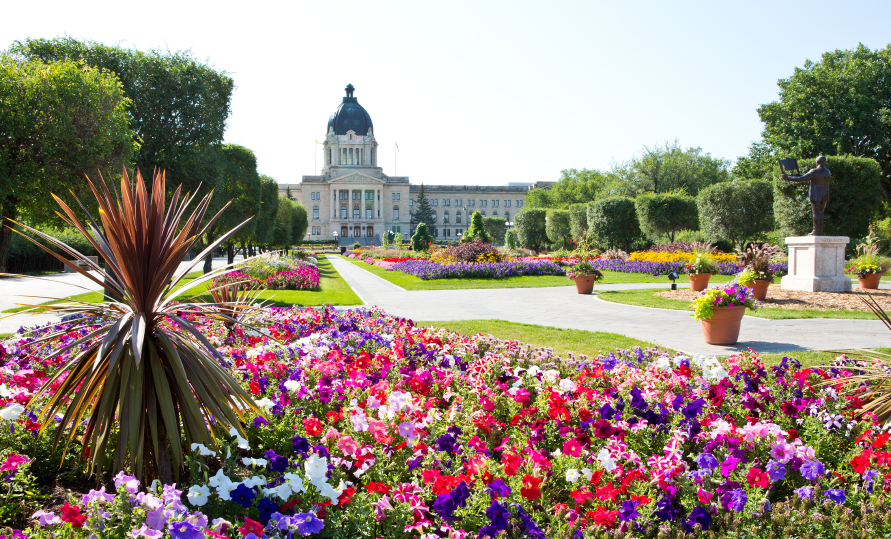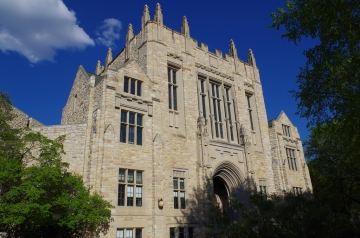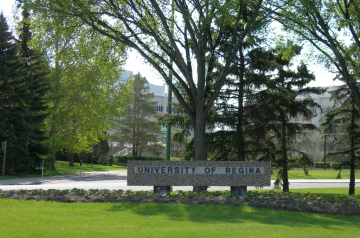Study in Saskatchewan
Saskatchewan offers high-quality, affordable education that attracts international students from around the world.
The province offers state-of-the-art research and innovation facilities and top-quality educators. Universities, colleges and technical institutes in Saskatchewan offer a wide range of courses and credentials, from trade certifications to doctoral degrees.
Upon completion of a study program in Saskatchewan, international students can take advantage of bountiful skilled employment opportunities in the province, as well as options for permanent immigration to Canada.

Got a question about studying in Saskatchewan? Our comprehensive Studying in Saskatchewan FAQ page has the answers. If your question is not included, please contact us today and submit your question.
Population
1.14 million
International Student Population
4,791 (2014 figures)
Location

Main Study Destinations
Saskatoon, Regina
Studying in Saskatchewan: The Advantages
World-Class Education in Smaller Urban Centres
Saskatchewan has two world-class, publicly-funded, government-accredited universities that attract international students from many countries around the world. These universities are located in Regina and Saskatoon, respectively, both of which have a population of less than 250,000. For students who prefer not to be in large cities with a population of multiple millions, Saskatchewan is a highly attractive option.
The Lowest Unemployment Rate in Canada
Saskatchewan has, for the past number of years, had the lowest unemployment rate in the country.
Immigrate After Studying in Saskatchewan
The Saskatchewan Immigrant Nominee Program (SINP) Experience Category
The SINP Experience Category includes a sub-category that caters for students who have graduated from a recognized post-secondary educational institution in Canada to apply for permanent immigration to Canada. There are slightly different requirements for applicants who graduated from an institution in Saskatchewan, compared with those who graduated elsewhere in Canada, with the former benefiting from less onerous work experience requirements.
Express Entry
Candidates for immigration to Canada through the federal Express Entry immigration selection system who have completed their education at a school in Saskatchewan may be awarded a significant number of points on account of their high level of education. Moreover, international graduates of Canadian educational institutions may have obtained important Canadian work experience, another highly valued factor under the Express Entry system.
Destination Schools in Saskatchewan
These institutions are featured due to their size, proximity to urban centres, and tradition for enrolling international students into their student bodies. Learn more about each school by clicking their titles below, which will take you to the relevant page on School Search.
The University of Saskatchewan
The University of Saskatchewan has historically been regarded as an agricultural university, but is also a leader in many other forms of science and technological research.
Signature programs: Animal Bioscience, Agribusiness, Toxicology, Science in Engineering
Location: Saskatoon

The University of Regina
With 10 faculties and 25 academic departments, the University of Regina's offerings are comprehensive. This school offers practical opportunities to put learning to work.
Signature programs: Nursing, Business Administration, Health Studies, Systems Engineering
Location: Regina

Other Select Schools in Saskatchewan
Select Schools are those that CanadaVisa has assessed for quality, value, and competency with international students. These schools are accredited by Colleges and Institutes Canada (formerly the Association of Community Colleges of Canada) or are chosen because of proven pathway programs and exemplary student services.
In order to apply for a Canadian study permit, prospective international students must first obtain a letter of acceptance from a Designated Learning Institution (DLI). As each institution may have different admission requirements and application processes, interested applicants may contact the desired institution(s) individually. Find out more about studying in Saskatchewan.
For a full list of DLIs by province, click here.
- The University of Regina, founded in 1974, is a younger institution — but it has come a long way in under fifty years. In its short time as an institution, it has firmly established itself as an innovator and an outlier: it was the first university in Western Canada to offer co-op studies. A broad student population comprised of international students, Canadians, and aboriginal students have access to programs in 15 faculties and academic departments. The stunning campus landscape, complete with a park and a lake, has interconnected buildings to help students manage the prairie winter.
- Signature programs: Nursing, Business Administration, Health Studies, Systems Engineering (Environmental, Electronic, Petroleum).
- The University of Saskatchewan has historically been regarded as an agricultural university. While this is still true today, the U of S is a leader in many other forms of science and technological research. U of S also ranks highly in Canada for Medicine and Environmental Science. The U of S campus sits on the east bank of the Southern Saskatchewan River in the sweeping city of Saskatoon.
- Signature programs: Animal Bioscience, Agribusiness, Toxicology, Engineering, Environmental Science, Medicine
- Established in 1913, Luther College is a unique one hundred-year old institution. It is both a high school and a federated college to the University of Regina, which means that while it cannot confer degrees, many of its courses are held at the university. This unique combination allows for small class sizes — fewer than 20 students per professor — and student support while maintaining access to the amenities provided by its much larger host.
- Signature programs: English, Geography, Mathematics, Philosophy, Psychology, Religious Studies
- Saskatchewan Polytechnic is the premier polytechnic in the province, with a large offering of courses. In fact, the school has almost 150 complete programs. Saskatchewan Polytechnic offers one-year certificate programs, two-year diplomas, and a four-year bachelor nursing program which is delivered jointly with the University of Regina. The school is industry responsive, and students receive personalized attention and hands-on opportunities to learn. A big draw for many students is also its mining, energy and manufacturing school.
- Signature programs: Trades, Media Arts Production, Engineering Technology, Hotel and Restaurant Management, Natural Resources and Built Environment, Recreation and Community Development
- Parkland College was Saskatchewan’s first regional college. The college has earned itself a reputation for the trades — especially professional firefighter training — and a hands-on approach culminating in professional diplomas and certificates. University transfer courses also allow for diploma-to-degree programs with the University of Saskatchewan and the University of Regina, at both the graduate and the undergraduate level. The school also has links with Saskatchewan Polytechnic.
- Signature programs: Firefighting, Dentistry, Education, Emergency Medical Response, Nursing, Power Engineering, Optometry, Social Work
- Engineering, Agriculture, and health programs are popular in Saskatchewan. Because of Saskatchewan’s principal industries, graduates from these programs may have a range of job opportunities open to them after graduation.
- In addition to the above, it is possible to pursue a wide range of study programs at Saskatchewan universities and colleges.
Tuition for international students in Saskatchewan varies widely between colleges and universities, and between different study programs. As a rough estimate, international students may expect to pay between $10,000 and $18,000 per year at a college. International students may expect to pay between $16,500 and $20,000 per year for Bachelor programs at universities. Language school and graduate school tuition may differ significantly.
International students studying in Canada are required to purchase health insurance. Often, this is organized through the post-secondary institution. Upon arrival in Saskatchewan, international students are eligible to receive basic Saskatchewan hospital and medical coverage at no charge.
In order to apply for a study permit, a potential international student must show that he or she has $10,000 in addition to tuition fees to cover living expenses in Saskatchewan. This equates to $833 per month.
The below is an approximate estimate of living costs for 12 months for an international student in Saskatchewan. Cost of living can vary greatly depending on urban or rural location.
| Factor | Per month (approx.) | Per year (approx.) |
|---|---|---|
| Accommodation (shared, off-campus) | $500 | $6,000 |
| Food | $300 | $3,600 |
| Clothing, miscellaneous | $150 | $1,800 |
| Recreation and entertainment | $150 | $1,800 |
| Transportation (Regina student price) | $72 | $864 |
| Phone bill | $50 | $600 |
| Internet | $50 | $600 |
| Utilities | $100 | $1,200 |
| Cost of living total (not including institution-specific costs above) | $1,372 | $16,464 |
International students in Saskatchewan may have access to private loans on the same terms as Canadian citizens and permanent residents. Loans may be offered by banks, student organizations, or other groups. It is important to properly research loan options, and understand the interest and repayment plans, before committing to any contract.
Many organizations and institutions may offer scholarships or bursaries to international students studying in Saskatchewan. For more information, students are encouraged to contact the international student services department of their institution.
Graduate programs in particular often have funding options for students pursuing a Master’s or PhD program. It is important to contact the educational institution directly for more information.
- As a popular program across Canada, it is possible to study Engineering in many Saskatchewan universities and colleges.
- The University of Saskatchewan and the University of Regina both have strong, well-known Engineering programs, offering a wide variety of specializations. University of Regina is particularly known for its Systems Engineering (Environmental, Electronic, and Petroleum) programs.
- Parkland College and Great Plains College are known for their Power Engineering programs.
- As an institute of applied science and technology, Saskatchewan Polytechnic offers a popular Engineering Technology program.
- As a popular program across Canada, it is possible to study Computer Technology and related programs in many Saskatchewan universities and colleges.
- The University of Regina’s Computer Science department offers 10 programs of studying, ranging from Bachelor to graduate degrees, and diplomas. The University of Saskatchewan offers Bachelors of Science in Computer Science or Software Engineering.
- As an institute of applied science and technology, Saskatchewan Polytechnic offers a range of computer and technology programs.
- As a popular program across Canada, it is possible to study Nursing and related health programs in many Saskatchewan universities and colleges.
- Nursing and Health Studies are signature programs of the University of Regina.
- Parkland College specializes in Nursing education — students wishing to pursue the the Bachelor of Science in Nursing degree from the University of Saskatchewan can take the entire degree at Parkland College. The college has also joined with Saskatchewan Polytechnic to offer a Practical Nursing diploma program.
STEM is an acronym for Science, Technology, Engineering, and Mathematics. While careers in STEM fields are popular, there is no specific program entitled “STEM” in a Saskatchewan college or university. Prospective students are encouraged to research programs in their particular area of interest. Use the School Search tool to research programs in these fields.
- Saskatchewan has one of the lowest unemployment rates in the country.
- Saskatchewan’s main employment sectors include Healthcare and Social Assistance, Education services, Agriculture, and Construction. The Professional, scientific and technical services sector saw significant growth between September 2015 and September 2016.
- Learn more about the economy and employment in Saskatchewan.
- Use the Canada Job Search Tool to look for open positions across Saskatchewan and Canada.
Graduates from a DLI in Saskatchewan may apply for the Post-Graduation Work Permit after graduating from an eligible study program.
The The Saskatchewan Immigrant Nominee Program (SINP) Saskatchewan Experience Category includes a sub-category that caters for students who have graduated from a recognized post-secondary educational institution in Canada to apply for permanent immigration to Canada. Applicants who graduated from an institution in Saskatchewan may be eligible if they have six months of work experience in Saskatchewan and a permanent, full-time job offer from a Saskatchewan employer.
International graduates may pursue an application for permanent residence through the federal Express Entry immigration system. Candidates for immigration to Canada who have completed their education at a school in Saskatchewan may be awarded a significant number of points on account of their high level of education. Moreover, international graduates of Canadian educational institutions may have obtained important Canadian work experience, another highly valued factor under the Express Entry system.
As it is far from any body of water, Saskatchewan’s climate is dry and warm in summer. Saskatchewan may be known for its cold winters, but its towns and cities are well equipped to help residents deal with the cold temperatures. Interesting fact — more tornadoes occur in Saskatchewan than anywhere else in Canada.
Saskatchewan has two world-class, publicly-funded, government-accredited universities that attract international students from many countries around the world. These universities are located in Regina and Saskatoon, respectively, both of which have a population of around 250,000. For students who prefer not to be in large cities with a population of multiple millions, Saskatchewan is a highly attractive option.
- The two main cities are Regina and Saskatoon. Regina, in the south of the province, is home to well-known post-secondary institutions — the University of Regina is here, as well as one of Saskatchewan Polytechnic’s campuses. It is known for its high number of parks and green spaces.
- Saskatoon is the province’s largest city, and one of the fastest-growing population centres in Canada. It also has the distinction of being the only major city in Canada to be named after a food item — the Saskatoon berry. It is home to the University of Saskatchewan and one of Saskatchewan Polytechnic’s campuses.
- Other main cities in Saskatchewan include Prince Albert, Moosejaw, and Yorkton (where Parkland College is located)

